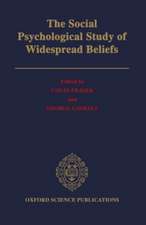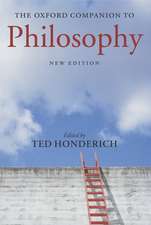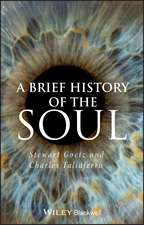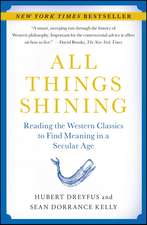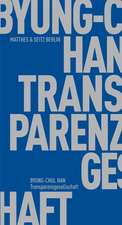Debating Religious Liberty and Discrimination
Autor John Corvino, Sherif Girgis, Ryan T. Andersonen Limba Engleză Paperback – 27 iul 2017
Preț: 155.84 lei
Preț vechi: 166.96 lei
-7% Nou
Puncte Express: 234
Preț estimativ în valută:
29.83€ • 32.41$ • 25.07£
29.83€ • 32.41$ • 25.07£
Carte disponibilă
Livrare economică 20-26 martie
Preluare comenzi: 021 569.72.76
Specificații
ISBN-13: 9780190603076
ISBN-10: 0190603070
Pagini: 352
Dimensiuni: 206 x 137 x 23 mm
Greutate: 0.48 kg
Editura: Oxford University Press
Colecția OUP USA
Locul publicării:New York, United States
ISBN-10: 0190603070
Pagini: 352
Dimensiuni: 206 x 137 x 23 mm
Greutate: 0.48 kg
Editura: Oxford University Press
Colecția OUP USA
Locul publicării:New York, United States
Recenzii
Overall, this book is a thought-provoking endeavour, and it is commendable that the authors have tried to challenge one another and to find areas of agreement. Their willingness to reach out and engage in reasoned debate is valuable in and of itself.
...the U.S. remains a large country with citizens of many religions, diametrically opposed opinions, and lifestyles that will inevitably clash. Given that conflict is unavoidable, the authors agree that we ought to foster a culture in which we can seek common ground and conduct debate on the plane of ideas and policy, rather than descend into endless painful lawsuits or bitter social-media feuds with our ideological opponents. Corvino, Anderson, and Girgis illustrate in this compelling book that such a judicious debate can take place and can generate fruitful conversation, as well as delineate areas of authentic agreement and practical compromise. And, perhaps even better than that, they give us the tools we can use to find those agreements and compromises ourselves.
Debating Religious Liberty and Discrimination ... raises the plausibility of living with greater diversity of thought on fundamental issues in civil society. Learning to tolerate religious disagreement has been a signal achievement of liberal societies, and if we can live together with mutually exclusive but also reciprocally respectful religious systems thriving in civil society, why can't we expand the scope of that tolerance to include other moral and social issues that divide us?
... all three authors deserve praise for tackling this subject in this way. They disagree civilly and engage with one another substantively and thoughtfully. In an age when discussions of religious liberty often devolve into cheap political point-scoring, the fact that elevated debate occurred with both charity and clarity is perhaps the ultimate value of this book. May it be a model to disputants on this and other heated subjects, for years to come.
In our deeply divided nation, Debating Religious Liberty and Discrimination is a refreshing and hope-inspiring book. Provocative, clear, careful in argument, searching in coverage, it shows that people who strongly disagree can both find much common ground and also articulate their differences with respect and care, fostering a community of reason. It will be a wonderful book for undergraduate teaching, but it is also challenging for people well-versed in the subject, whether they agree or disagree.
Though the authors test the boundaries, they remain within the assumptions of American constitutional discourse and achieve a well-organized, clear, and civil exploration of the issues.
...the U.S. remains a large country with citizens of many religions, diametrically opposed opinions, and lifestyles that will inevitably clash. Given that conflict is unavoidable, the authors agree that we ought to foster a culture in which we can seek common ground and conduct debate on the plane of ideas and policy, rather than descend into endless painful lawsuits or bitter social-media feuds with our ideological opponents. Corvino, Anderson, and Girgis illustrate in this compelling book that such a judicious debate can take place and can generate fruitful conversation, as well as delineate areas of authentic agreement and practical compromise. And, perhaps even better than that, they give us the tools we can use to find those agreements and compromises ourselves.
Debating Religious Liberty and Discrimination ... raises the plausibility of living with greater diversity of thought on fundamental issues in civil society. Learning to tolerate religious disagreement has been a signal achievement of liberal societies, and if we can live together with mutually exclusive but also reciprocally respectful religious systems thriving in civil society, why can't we expand the scope of that tolerance to include other moral and social issues that divide us?
... all three authors deserve praise for tackling this subject in this way. They disagree civilly and engage with one another substantively and thoughtfully. In an age when discussions of religious liberty often devolve into cheap political point-scoring, the fact that elevated debate occurred with both charity and clarity is perhaps the ultimate value of this book. May it be a model to disputants on this and other heated subjects, for years to come.
In our deeply divided nation, Debating Religious Liberty and Discrimination is a refreshing and hope-inspiring book. Provocative, clear, careful in argument, searching in coverage, it shows that people who strongly disagree can both find much common ground and also articulate their differences with respect and care, fostering a community of reason. It will be a wonderful book for undergraduate teaching, but it is also challenging for people well-versed in the subject, whether they agree or disagree.
Though the authors test the boundaries, they remain within the assumptions of American constitutional discourse and achieve a well-organized, clear, and civil exploration of the issues.
Notă biografică
John Corvino is Chair of the Philosophy Department at Wayne State University in Detroit, Michigan. He is the co-author (with Maggie Gallagher) of Debating Same-Sex Marriage (June 2012) and the author of What's Wrong with Homosexuality? (January 2013), both from Oxford University Press.Ryan T. Anderson is the William E. Simon Senior Research Fellow in American Principles and Public Policy at The Heritage Foundation, and the founder and editor of Public Discourse, the online journal of the Witherspoon Institute of Princeton, New Jersey.Sherif Girgis is a political theorist and a leading academic critic of same-sex marriage.





